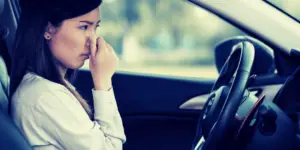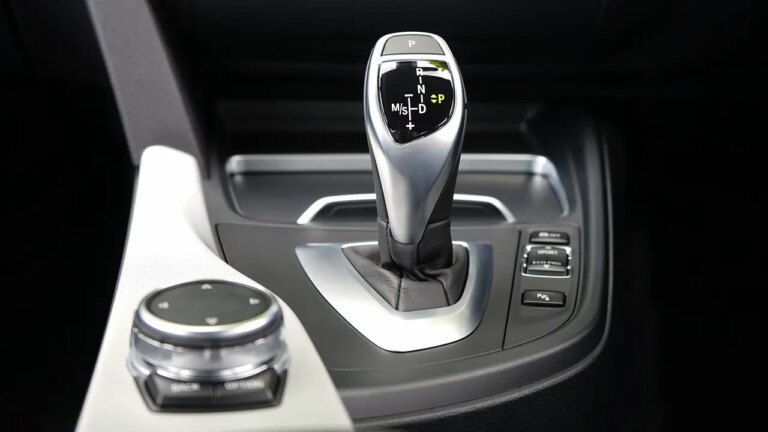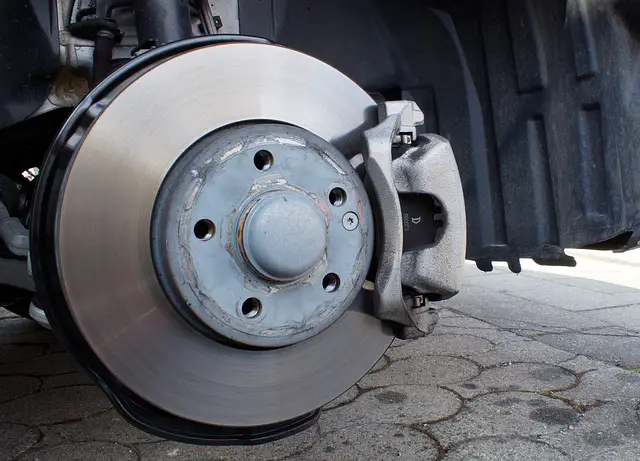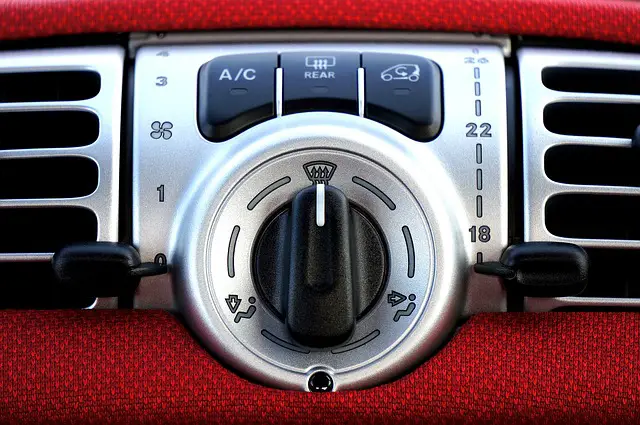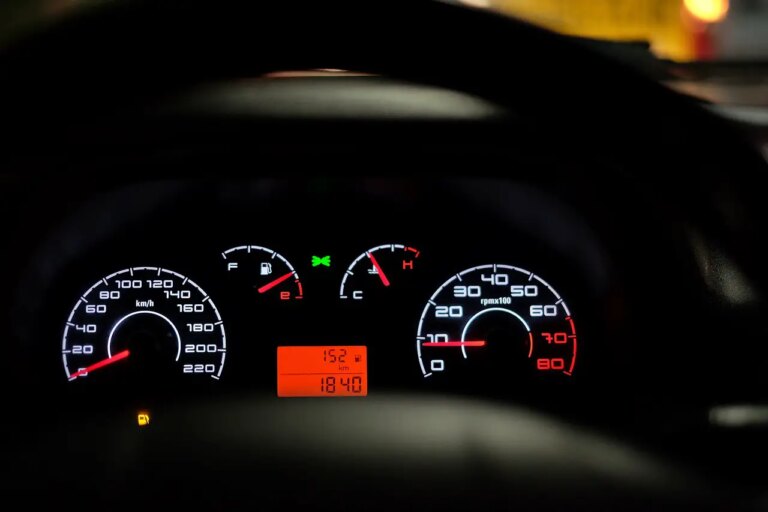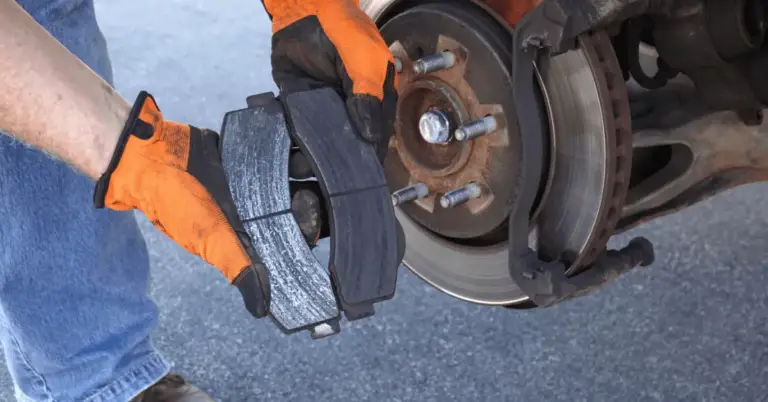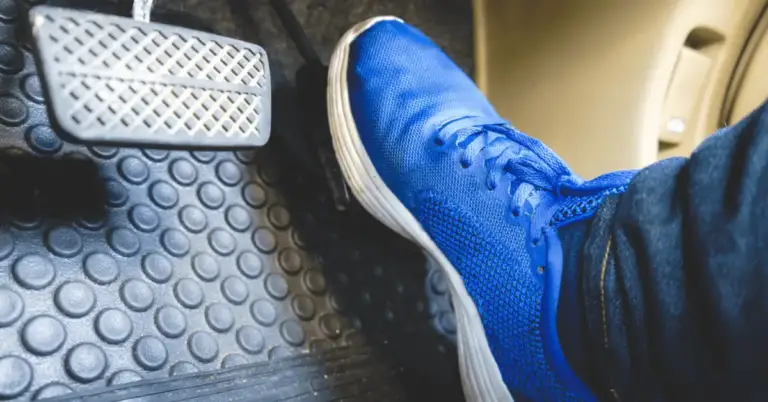If you are experiencing loud tire noise, there are four potential reasons, each with smaller subsets.
This article will explore all the causes of your tires being noisy and offer solutions to the problem if the noise is becoming irritating.
Generally, loud tire noise is because of either.
- Road conditions
- Driving style
- Tire construction
- Wheel Issues
Let’s look at each in more detail.
Tire Related Issues
Tread Pattern
There is a lot of scientific research surrounding tire tread design and how much noise it produces.
Each tread pattern produces a distinct frequency on the road. Tire manufacturers spend millions on research aimed at producing quieter tires.
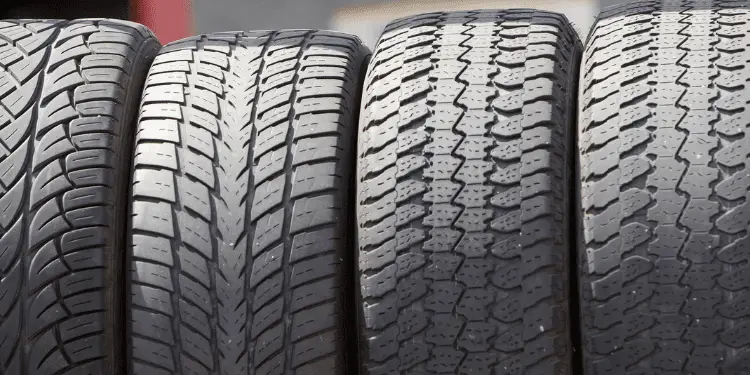
Often, tires employ a range of tread patterns to help quell louder sounds. Different tread blocks produce sound at various frequencies that neutralize each other, thus making it less detectable to the human ear.
With the use of computers, tire designers have developed various frequency tread patterns that employ a random pattern of blocks to reduce road contact and noise.
The lateral grooves of adjacent tread blocks are aligned with offset radial block placement and decrease the noise volume.
Winter Tires
In winter, to help you brake and turn safely, each winter tire is designed to clear away snow and ice. The greater grip means more decibels. It’s an unavoidable trade off.
Because summer tires are hard compared to the grippy softer rubber of winter tires, they may be used in subzero conditions without losing their flexibility or grip.
Winter tires also contain silica on the tread to provide a bit more dig into snow and ice. This also leads to an increase in noise levels.
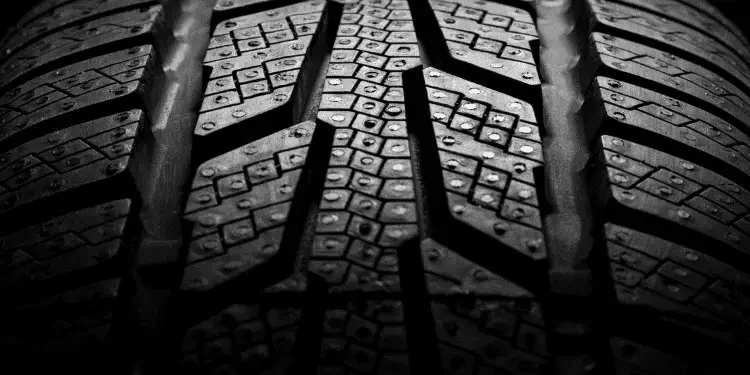
Most manufacturers recommend higher tire pressures for winter tires than summer tires. This maintains the correct contact patch and makes the car more stable on the road.
Winter tires include wider gaps between the deeper tread blocks that allow snow and ice to be displaced quicker when driving. If you’re driving fast along the highway, you may hear the sound of air being squeezed into the tire’s ridges.
As we know, winter tires are more costly than standard. Research on higher-end winter tires has reduced the increased noise, but it will never get the level down the same as all seasons or summer tires.
Low Profile Tires
Lower profile tires have less rubber in the sidewalls, contributing to the increased noise levels you’re hearing.
Because there is less rubber sidewall to absorb the sound, low-profile tires often make more noise. Their increased noise offsets the increased traction these tires provide. Low profile tires are often made with a firmer compound rubber and a more aggressive tread pattern.
Lower profile tires with a profile of 65 or below should be pumped to 40 to 45 PSI.
Performance Tire Noise
Performance tires are designed to be extra grippy. More and larger tread blocks mean less room for gaps between them for the air and noise to escape. A loud humming noise is the most common complaint with performance tires.
Standard tires have different size blocks along the circumference, which creates different frequency vibrations to resonate from the tire, which can help cancel each other out.
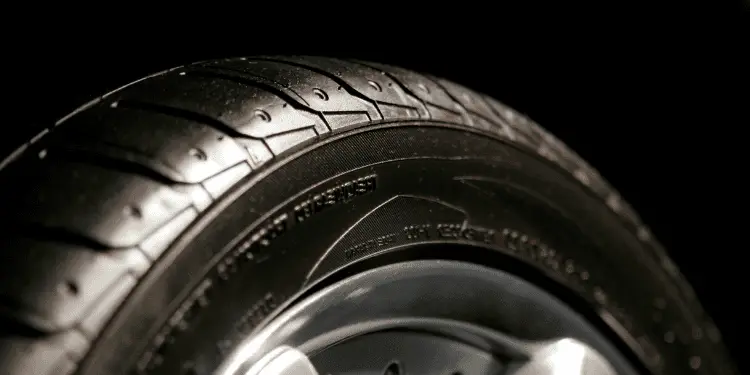
Performance tires generally have the same size block all over the tread.
Performance tires have stiffer sidewalls which give less and therefore contribute to the noise.
Tires Not Balanced
Uneven and rapid tread degradation are obvious signs that your tires need to be balanced.
Excessive tire noise is another indicator.
The tire will only travel freely if its areas are as uniformly weighted as achievable. This helps it to wear evenly and last as long as possible.
Balancing also improves ride comfort since uneven tires can bounce slightly, generating noise.
Tires Rubbing Against Wheel Well
If you only have loud tire noises when you turn the steering wheel, your tires might be rubbing against the wheel well. Standard tires and rims should never rub but just may if the wheels are very badly aligned.
If you see worn areas on your tires. You’ll need a wheel alignment if you have standard wheels and tires.
You will need wheel spacers if you have larger wheels than the car was designed for. This will move your wheels away from assembly and give more clearance. It will stop the rubbing and stop the scarping noise you’re hearing.
Uneven Tread Wear/Bubbles/Out Of Round
All tires make noise, but the volume will increase if the tire is faulty. Many tire treads wear unevenly, usually due to poor alignment or balancing. Sometimes the defects are difficult to see. For instance, to spot wear on the inside of your tire, you may have to turn the wheel fully when parked and inspect it.
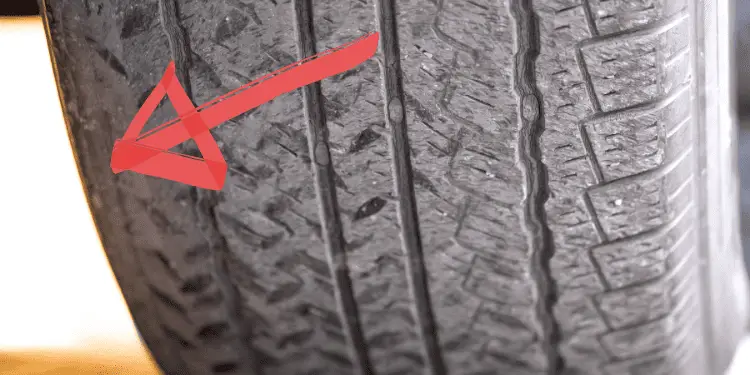
A bubble in a tire sidewall or a slightly out of round tire is a common problem that increases tire noise.
A bubble in the sidewall will be obvious, while an out of round tire may be more difficult to see.
All three issues can increase tire noise. Uneven tread can cause a loud humming noise from the bad tire.
An out of round tire will cause the steering wheel to shake and a whirring/whining noise from the bad tire, especially at high speeds.
Under Inflated Tires
We know that tire noise results from the rubber coming into contact with the road. Therefore the more rubber touching the road, the more noise will be heard.
Underinflated tires will cause loud noise because less air causes more of the tire surface to contact the road.
Driving Style Causes Loud Tire Noise
Fast Highway Driving and Noisy Tires
Most tire noises will increase the faster a car is driven. On highways, a loud droning or humming noise is often heard. It may not be present at lower speeds.
When driving at a constant speed, the tires will resonate the same sound frequency compared to the variance experienced in city stop/start driving. This continual play will sound like a hum in the cabin at the same frequency.
The larger and more regular the tread blocks, the louder the sound.
Road condition also plays a part in volume. Older, shinier roads and grooved pavements will increase the noise level.
Hard Braking
Some tires are better at stopping your car than others. You may notice a squeal or screech when you brake hard.
This noise used to be more common before ABS became standard on cars. During braking, the ABS monitors the speed of the wheels to determine whether or not they will lock up. Hydraulic valves limit or lessen braking on a wheel if it attempts to lock up.
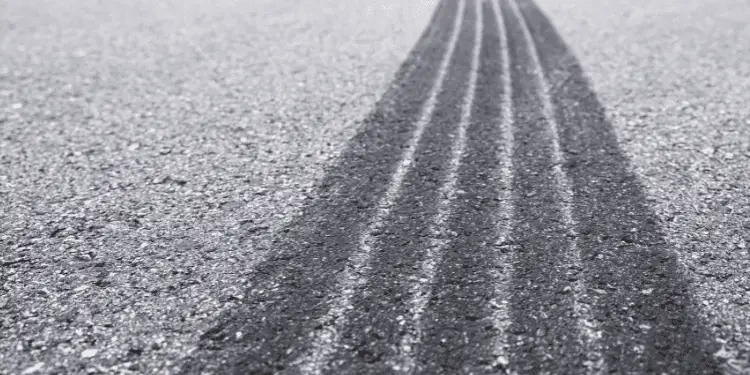
This keeps you from sliding and gives you full control of the steering. It is fulfilled on a wheel-by-wheel basis.
Hard braking results in the wheels’ locking up, and the same contact patch of tread is in contact with the road.
High Speed Cornering
When cornering at high speed, more weight is added to the drive wheel on the side you are turning into. This extra weight and angle the tire faces causes screeching as the tire attempts to maintain grip and keep you on the road.
This squealing noise is louder if your tires are not inflated at the correct pressure, as the sidewall may contact the road on the outside of the tire.
Heavy Load Tire Noise
A loud rumbling or humming noise from your tires can happen when you’ve loaded your car or truck up with a lot of weight but haven’t increased the tire pressure to compensate.
All car and tire manufacturers will stipulate what the increased PSI should be. Generally, it’ll be in the region of 10 PSI. Some carmakers recommend an increased tire pressure for all four tires, while others advise increasing the rear tires if extra weight is carried in the trunk.
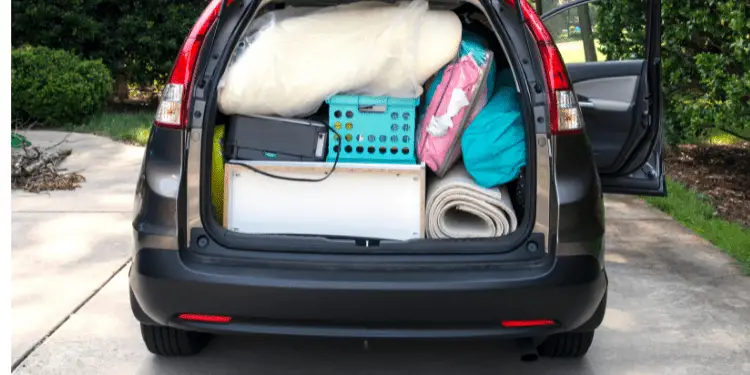
It’s always best to check around your tires after carrying a heavy load and check for a wear line on the sidewall close to the tread pattern. If visible, the sidewall has come into contact with the pavement and weakened the tire(s). If you see this, it’s time to get the tire replaced.
Other parts may have failed if your car has been overloaded beyond what it was designed for. Suspension, transmission, and axle issues will cause loud noises too.
Road Conditions and Loud Tire Noise
Concrete Pavements
Concrete roads are cost effective compared to asphalt in terms of installation and upkeep costs.
However, there is a trade off.
Concrete is susceptible to cracking because of its rigidity and inability to tolerate changing weather extremes. They are arranged in short sections to prevent the slabs from breaking and fracturing.
You’ll notice a rhythmic beating when driving over the joints under your tires. The expansion joint’s age and condition directly correlate to its noise level. The older and less defined, the louder the tire noise.
There is more:
A level concrete surface is completely flat, but no one wants a smooth road surface. It has no traction.
As a result, ridges and grooves are scoured over the width of a concrete road after it is constructed.
They’re unevenly placed at varying depths to prevent passing tires from creating a continuous whining of the same frequency. However, passing tires will still create a continuous humming noise over the ridges.
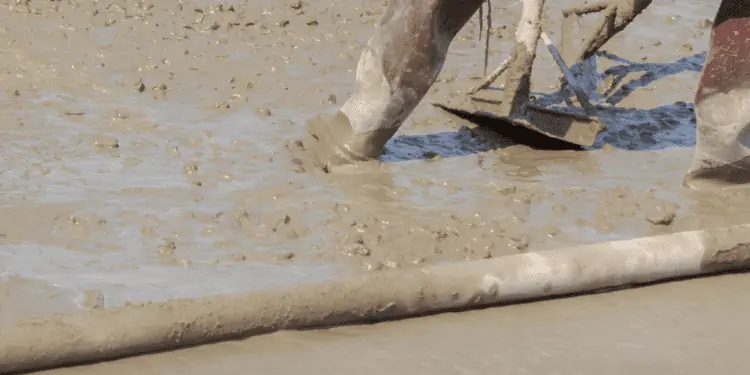
On asphalt, the air gaps absorb part of the vibration from tires, and asphalt doesn’t create much noise in the first place.
However, the tires’ sound may be loud because of the concrete’s ridges. It gets polished by passing vehicles and smooths out as concrete ages, causing even more noise.
Old Asphalt Pavements
New asphalt is the quietest road surface commonly used, but they also age the quickest. Generally, an asphalt road is good for 25 years, but many factors can shorten this. A poor base level, extremes of temperature, and lack of regular maintenance can cause it to fail.
Older asphalt doesn’t absorb noise because it can crack, become shiny, and lose elasticity.
The difference between driving onto an old asphalt section of road to a new one is very noticeable. The latter is almost silent and a joy to drive on.
Grooved Highways
Roads in accident prone areas where skidding in wet conditions is a problem are often grooved by the state. These groves running along the length of the concrete slab allow water to drain better and increase traction.
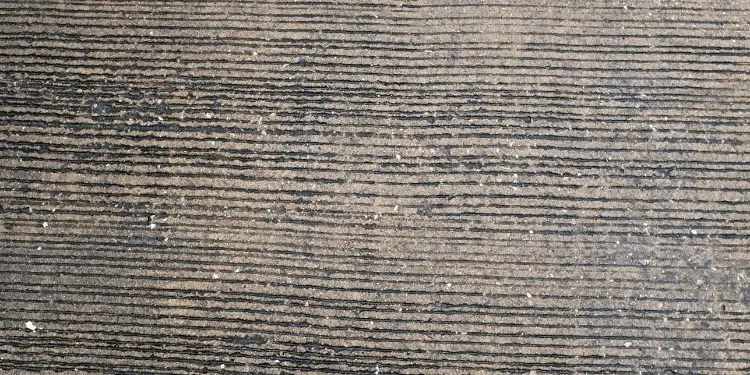
Older grooved roads were noisy as the pitch would resonate, but newer techniques keep any additional tire noise to a minimum.
Potholes
As hitting a pothole is a short event, it won’t create any indifference in tire noise at the time. A pothole can cause damage to the tire, wheel, and alignment issues which we’ll explore further on.
Rain On The Road Surface
There is a noticeable increase in traffic noise when it rains due to the spray created by wheel movement. Furthermore, the water on the surface interacts with the formation of noise created by the contact of road and tire and exacerbates this noise distribution.

This noise increase is determined by the kind of tire, composition of the road, vehicle characteristics, and the speed at which it travels. Porous pavements are often less loud than non-porous ones, yet the tire noise on both rises by the same amount when wet.
Rain on highways increases tire noise by 4dB, especially at higher speeds.
Mechanical Faults and Tire Noise
How To Reduce Tire Noise?
Bad Wheel Bearing Noise
A bad wheel bearing and tire problem are two of the most common misdiagnosed car faults. It’s not surprising as both can cause similar noises and are located very close to each other. Often a rookie home mechanic will change a tire only to discover the wheel bearings need to be replaced.
Bad wheel bearings can make a loud noise. The sound can be a low growling, a cyclical chirping noise that increases with speed, or a hum.
The humming noise can often be confused with a bad tire. A worn, cupped, or scuffed tire can hum, but it won’t growl or chirp.
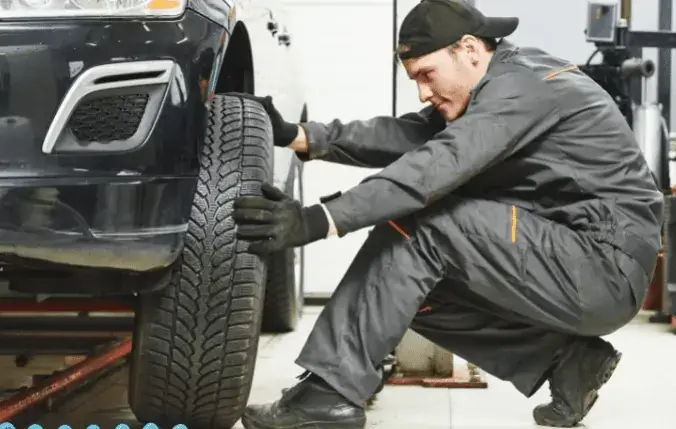
It’s easy to check for a bad wheel bearing. Jack up the wheel and rock it back and forth, holding it 3 to 9 and then 12 to 6. Any movement indicates the wheel bearings need replacing.
Incorrect Wheel Rotation
It’s important to rotate tires from back to front regularly. Doing so evens out wear and
makes the tires last longer.
Loud tire noise is more common on tires that haven’t been rotated. They can become cupped and reduce the grip available to you when you need it.
Rotation that’s done incorrectly can lead to an increase in tire noise. Most tires are directional, which means the tread pattern is designed to work best when fitted on a specific side of the tire.
An arrow indicates which way the tire should spin. The tread on a tire facing the wrong way will not only perform far worse in the rain but will make noises.
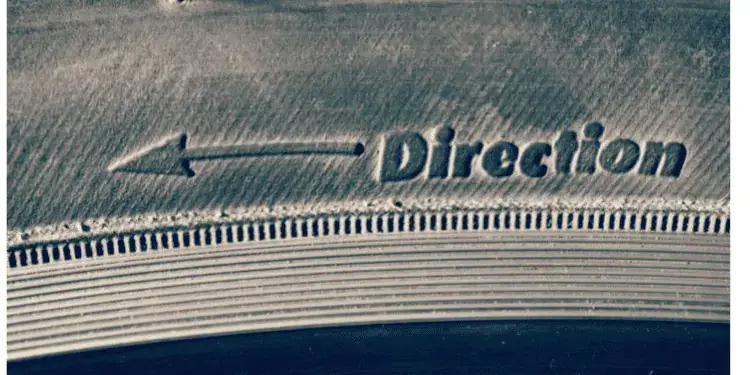
Now all tires make noises, but if you notice a louder hum after rotating your tires, check the directions of the arrows are facing forward.
How To Reduce Tire Noise
Trade Up To A Luxury Car
This is probably out of the scope of most people, but more expensive cars are a higher price for a reason.
All the car parts are of better quality, including the soundproofing. Tire noise is inevitable. How loud it gets inside can be influenced, though.
Higher specs cars need to stand out when it comes to driver experience. They’ll spend big money keeping tire noise out of the cabin as much as possible. They do this by using better soundproofing materials and lots of it. Some luxury cars use thicker glass to block out outside noise.
Right at the top end, there are cars with Active Noise Cancellation. This clever piece of electronics uses speakers to scan for noise and then deploys the opposite sound wave to deaden it. The result is no tire noise!
Change Tires
Changing the tires is cheaper than upgrading your car to a luxury one. In the U.K and the EU, tires are noise level rated. This is an easy reference guide for people who want to buy quieter tires. We don’t have a similar system in the U.S, but it’ll come as no surprise to discover most of the quieter tires are well known branded makes such as Continental and Michelin, Pirelli, and Dunlop.
You seem to get what you pay for when it comes to quieter tires.
Related article: How Long Do New Tires Take To Put On? [ANSWERED]
Tire Traits To Look Out For
Reducing tire noise is a scientific field of study. Inventors have worked out how to modify tread patterns to alter frequencies and interrupt airflow. Here’s what to consider when buying quieter tires:
- Ribs all around the perimeter with linear grooves in between.
- Various tread block shapes are used to generate a multi-pitch tread pattern.
- Look for little hashed marks in the airflow channels.
- Smaller blocks.
- A thickened shoulder that serves to maintain the position of the blocks.
- Soft Rubber Compounds.
Many visitors also read this article: Why You Get Tire Noise After Rotation – [ANSWERED]
Are Loud Tires Dangerous?
Generally, lesser known brand tires will be noisier than well-known ones with large research budgets. There are other factors too.
Low profile performance, off-road, studded, and winter tires will all be louder than summer or all season tires. This is due to the fact they are designed to have more grip.
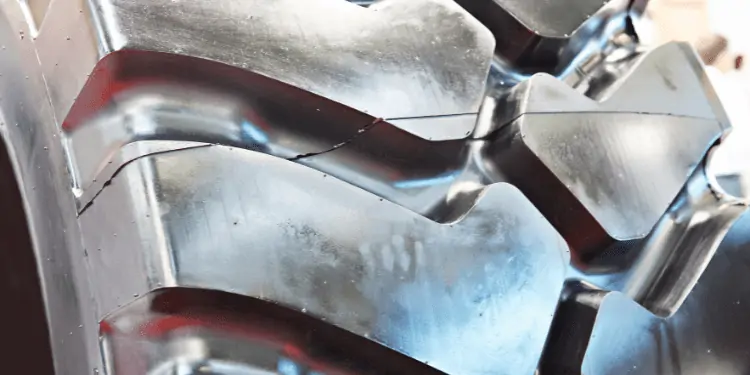
More grip = Fewer gaps between blocks = More Noise
Loud tires can be dangerous, though!
Worn tires will create loud humming noises, especially on older road surfaces or concrete.
Underinflated tires can create a womp womp noise or a slapping sound.
A badly out of round tire can cause a distinct thumping noise or a roaring sound as it jumps on and off the road.
A rare tire fault is a broken tire belt where the metal belts separate due to a fault in the manufacturing process. This can cause a loud slapping noise.
Many visitors also read this article: Broken Tire Belts – The Symptoms and Dangers of Bad Steel Tire Belts
Why Are New Tires Louder?
New tires require a break-in period to provide the best performance and comfort.
To remove adhesive and antioxidants applied during the tire manufacture, new tires must be driven a hundred kilometers on preferably dry roads. During this time, the tires may sound louder than you expected.
Also, remember that some tire brands are louder than others, so if you’ve replaced one brand with another, you should expect a difference in the noise level. New tires shaking is not normal, though, and should be investigated.


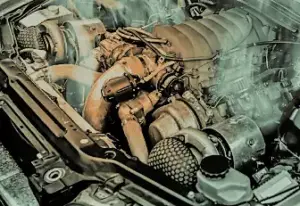
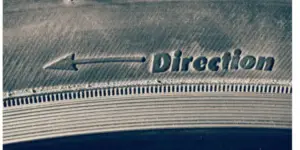

![Car Wobbles At Low Speeds - [Troubleshooter Guide] inflating-tire-on-balancing-machine](https://carzaza.com/wp-content/uploads/2023/12/inflating-tire-on-balancing-machine-300x150.png)
